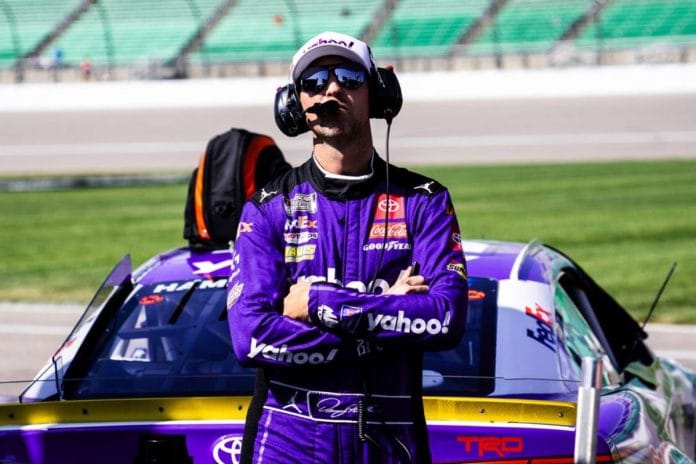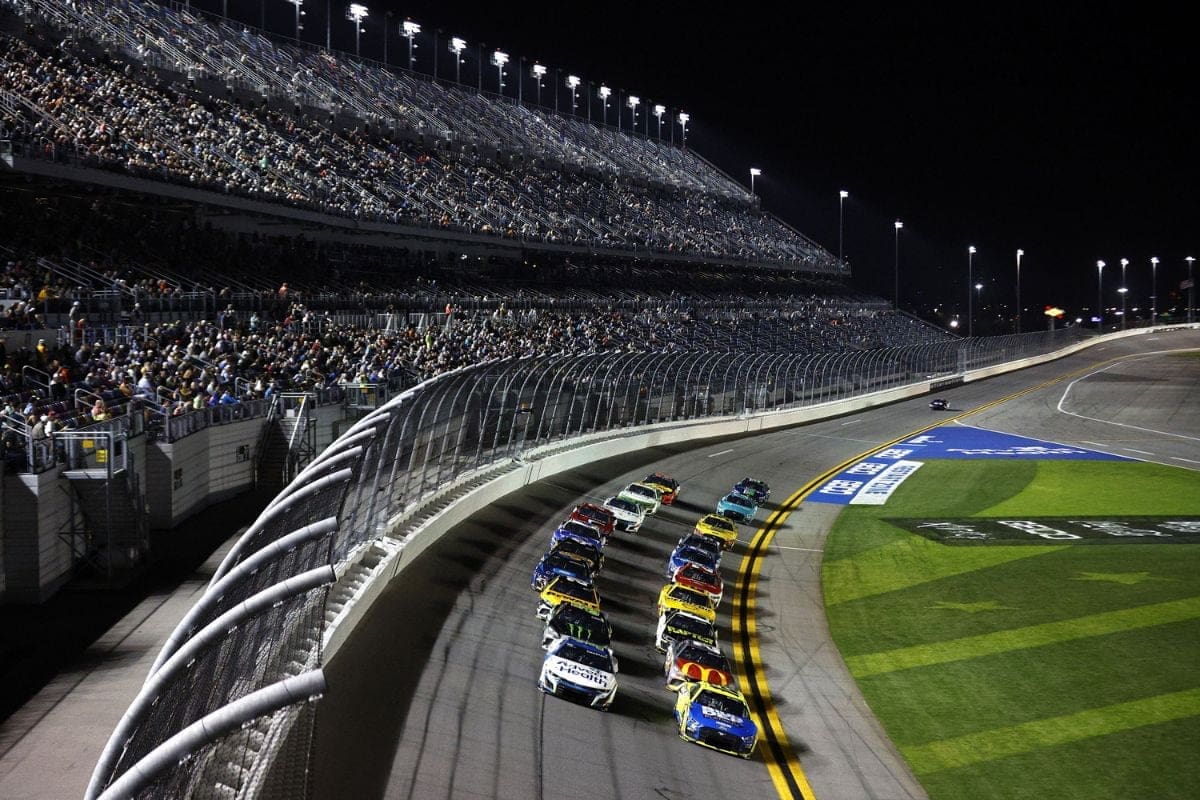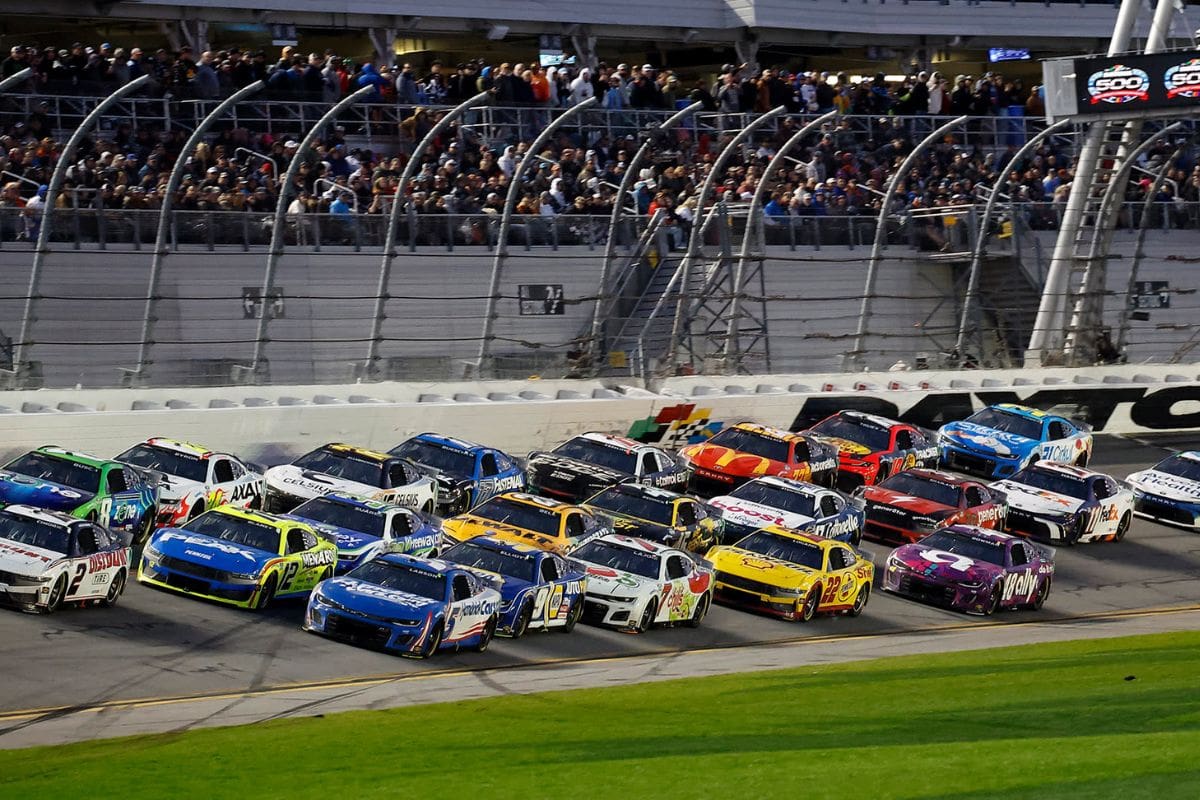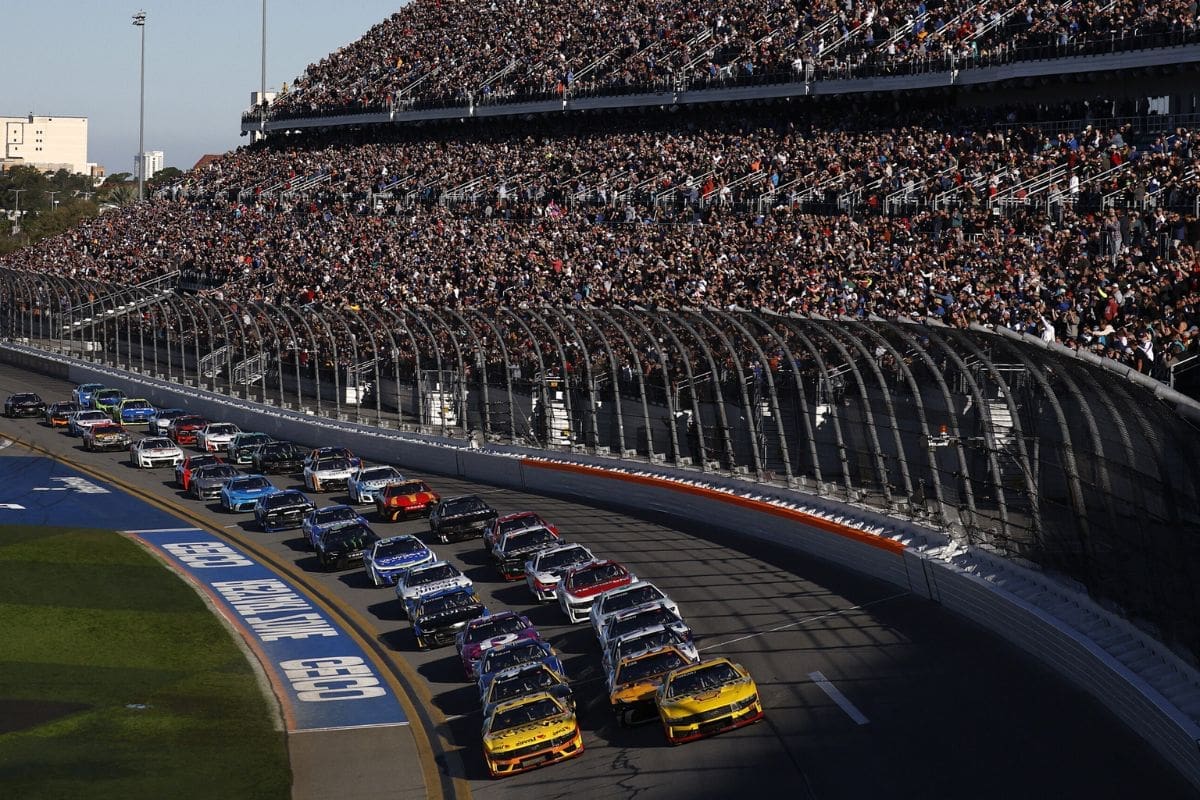Denny Hamlin Criticizes NASCAR’s Modern Era: Denny Hamlin‘s critique of NASCAR’s evolving landscape raises pertinent questions about the balance between entertainment and tradition within the sport. As NASCAR increasingly adopts chaotic racing strategies to captivate a younger audience, long-time fans express concerns about the erosion of competitive integrity and the authenticity of the racing experience. Hamlin’s call for a return to the sport’s roots invites a broader examination of whether the pursuit of entertainment is compromising the very principles that have defined NASCAR.
Key Highlights
- Denny Hamlin criticizes NASCAR’s shift towards entertainment, arguing it compromises the sport’s traditional values and integrity.
- Recent Daytona races, known for chaos, disrupt competitive narratives and challenge the meritocracy of racing outcomes.
- Aggressive driving tactics, like Austin Dillon’s bump-and-run, spark debate on whether spectacle is overshadowing competitive integrity in racing.
- Fans express a desire to preserve NASCAR’s cultural heritage, fearing that expansion efforts dilute the sport’s traditional roots.
- Hamlin calls for NASCAR leadership to balance entertainment with racing authenticity, emphasizing the importance of fan feedback in shaping the sport’s future.
Daytona’s Chaotic Reputation
Daytona’s chaotic reputation has long been a defining characteristic of its races, particularly highlighted during events like the Coke Zero Sugar 400. This race is notorious for its propensity to produce spectacular crashes, often referred to as the “Big Ones,” which can dramatically alter the competitive landscape. Top contenders frequently find themselves sidelined as unexpected drivers surge to the front, capitalizing on the unpredictable nature of superspeedway racing.
The 2024 Coke Zero Sugar 400 vividly showed this chaos, showing cars flipping into the wall and colliding at precarious angles. Such incidents entertain the audience and raise critical questions regarding the integrity of the competition. While the spectacle may captivate casual viewers, it can alienate hardcore fans who appreciate the tactical subtleties of racing.
Moreover, the emphasis on entertainment has transformed the essence of Daytona races, leading to a departure from traditional racing dynamics. Fans who once relished the gradual buildup of a driver’s season now witness a frenetic race environment, where unpredictability reigns supreme.
Change Affecting Integrity, Denny Hamlin Says
As NASCAR continues to evolve, the integrity of the sport has come under scrutiny, particularly from veteran drivers like Denny Hamlin. The evolution, marked by notable changes since the early 2000s, has transformed NASCAR from its traditional roots into a spectacle heavily influenced by entertainment factors. This shift was particularly catalyzed by the multi-billion-dollar TV deals that aimed to attract new audiences but inadvertently diluted the sport’s essence.
Hamlin has voiced his concerns regarding the impact of this transformation on avid fans. During a recent episode of his podcast, “Actions Detrimental,” he articulated a growing dissatisfaction among long-time enthusiasts who feel alienated by the style of racing that prioritizes showmanship over competitive integrity. He pointed out that many older fans are disenchanted with the current racing dynamics, which often resemble chaotic entertainment rather than the skillful tactics they once revered.
“We’ve just evolved into entertainment, and I understand that. I just need to see more hard data that proves that going this way that we’ve gone over the last decade has increased ratings…Someone has to prove that to me. Because certainly, you know, you see on social media, the hardcore fans saying ‘what the heck’ when it comes to…it.” – (hamlin)
Moreover, Hamlin emphasized the need for empirical data to substantiate claims that this shift toward entertainment has positively affected viewership ratings. His skepticism reflects a broader sentiment within the community that questions the sustainability of NASCAR’s current path.
As feedback from social media suggests a disconnect between the evolving product and the expectations of dedicated fans, it raises critical questions about the future integrity of the sport.
The Wild Daytona Race and Unexpected Results
The recent Daytona race displayed the unpredictable nature of NASCAR, resulting in Harrison Burton’s stunning initial career victory. This event highlighted the volatility inherent in superspeedway racing and raised questions about the broader implications for the sport as it approaches the playoffs.
Burton’s success can be characterized as representative of the wildcard potential that defines Daytona, where unexpected outcomes often disrupt established narratives.
Denny Hamlin, a seasoned competitor, provided insight into this phenomenon, emphasizing the contrast between the chaotic nature of Daytona and the more methodical approach taken by drivers like Martin Truex Jr. While Truex may not have secured a win, his consistent performance positions him favorably in the points standings—a strategy that contrasts sharply with the “win-or-bust” mentality prevalent in superspeedway events.
Hamlin articulated the dual pathways available to drivers: the pursuit of victory in high-stakes races or the accumulation of points through steady performance. He acknowledged that Daytona could lead to surprise winners, challenging the traditional hierarchy of drivers and teams.
“It’s up to us to either go win or be so exceptionally good that you’re Martin Truex, right? He hasn’t won, but he’s been good enough to where he’s gonna get into the playoffs the old-fashioned way, that is, being good enough in points. So there’s multiple avenues to do it. But you just know at these superspeedways, you can have this type of winners that come out of the blue.” – (hamlin)
Austin Dillon’s Driving at Richmond
Richmond International Raceway witnessed a striking display of aggressive driving tactics, especially shown by Austin Dillon’s controversial bump-and-run strategies. This tactic, which involves deliberately nudging a competitor out of the way to gain position, raised eyebrows for its recklessness and implications on race integrity. Dillon’s approach resulted in an impressive overtaking and a penalty, showing the fine line between competitive aggression and unsportsmanlike conduct.
The incident showed a broader trend within NASCAR—where entertainment value increasingly trumps adherence to traditional racing values. While Dillon’s tactics generated substantial media attention and fan engagement, they also sparked dissent among purists who argue that such actions undermine the sport’s integrity.
Remarkably, Denny Hamlin has voiced concerns echoing sentiments from two decades ago, questioning whether the pursuit of spectacle is compromising the essence of racing.
This difference poses a challenge for NASCAR as it handles its identity in an evolving sports landscape. The wreck-loving nature of modern racing, especially in non-superspeedway environments like Richmond, raises significant questions about the long-term implications for driver conduct and fan expectations.
Fans Wanting the Sport to Stay at Home
A notable faction of NASCAR fans has expressed a desire for the sport to remain rooted in its Southern heritage, emphasizing the importance of traditional venues and events that have shaped its history. This sentiment was particularly vocalized during NASCAR’s expansion beyond its Southeast origins, which many fans viewed as a threat to the sport’s authenticity.
Protests emerged in 2004 when local figures, such as North Carolina’s Governor Mike Easley, championed the preservation of iconic races like the Southern 500 at Darlington—arguing that its longstanding legacy was integral to NASCAR’s identity.
Fans, like Robert Grissom, articulated a longing for the sport to honor its roots, suggesting that the Southern 500’s historical significance warranted its continued presence in the Cup Series schedule. The sentiment reflects a broader concern regarding the dilution of NASCAR’s cultural heritage as it seeks to broaden its market reach.
“It’s been here for 50 years. It’s one of the oldest tracks here.” – (Grissom)
NASCAR President Mike Helton acknowledged these concerns but asserted that growth necessitated tactical decisions, even at the potential cost of alienating traditionalists.
”I’m sorry they feel that way because I think there’s no form of sports, certainly not in motorsports, that understands, relies on, and believes in its tradition and heritage as does NASCAR. But you look at the concentration of races in the southeastern part of the United States and the lack of their ability to sell all the tickets because of the saturation of the events. It doesn’t mean we’re forsaking tradition or giving up on our heritage. In order to grow the sport beyond where it is today, we need to make smart decisions and I think the results will speak for themselves.” – (Mike Helton)
As veteran drivers like Denny Hamlin and Martin Truex Jr. approach retirement, the future of NASCAR’s identity hangs in the balance. The tension between maintaining tradition and pursuing expansion poses a critical question: Can NASCAR balance the demands of a broader audience while honoring the deep-seated values that have defined the sport for generations?
News in Brief: Denny Hamlin Criticizes NASCAR’s Modern Era
The ongoing debate surrounding NASCAR’s shift towards entertainment raises critical questions about the preservation of tradition and competitive integrity. Denny Hamlin’s insights highlight the tension between attracting younger audiences and maintaining the sport’s foundational values.
As chaotic racing tactics increasingly surface, it becomes vital to strike a balance that honors the heritage of NASCAR while allowing for necessary modernization. Ultimately, the future of the sport may hinge on ensuring authenticity amidst evolving entertainment dynamics.
ALSO READ: Bubba Wallace’s Uncertain Playoff Position, Denny Hamlin Extends Strong Support





